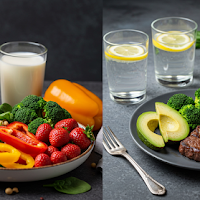An honest look at two of today's most popular and different eating styles.
In the world of nutrition, the vegan and ketogenic diets are like two different universes. One shuns all animal products, celebrating carbs from plants, while the other drastically cuts carbs and embraces fats. Both have passionate followers and impressive success stories, but they couldn't be more different. So, how do you know which one if any is right for you?
The Fundamentals: Vegan vs. Keto
The Vegan Diet
A philosophy-driven diet that excludes all animal products, including meat, dairy, eggs, and honey. It's centered around plant-based foods.
- Core Principle: No animal exploitation. Rooted in ethical, environmental, and health concerns.
- What You Eat: Fruits, vegetables, grains, legumes, nuts, and seeds.
- Potential Benefits: Rich in fiber and antioxidants, linked to better heart health and a lower risk of certain cancers.
- Potential Challenges: Requires careful planning to avoid deficiencies in vitamin B12, iron, and omega-3s.
The Keto Diet
A metabolic-focused diet that is very low in carbohydrates, moderate in protein, and very high in fat, designed to put the body into a state of ketosis.
- Core Principle: Force the body to burn fat for fuel instead of glucose (carbs).
- What You Eat: Meat, fatty fish, eggs, cheese, butter, oils, nuts, seeds, and low-carb vegetables.
- Potential Benefits: Can lead to rapid weight loss and improved blood sugar control.
- Potential Challenges: Highly restrictive, can cause a "keto flu" during adaptation, and may be high in saturated fats if not planned carefully.
Which Path Fits Your Lifestyle?
Choosing a diet isn't just about food; it's about finding a sustainable approach that aligns with your goals, preferences, and values.
Consider a Vegan Diet if...
- You are motivated by animal welfare or environmental sustainability.
- You enjoy eating a wide variety of plant foods like fruits, vegetables, and grains.
- You are willing to be mindful about supplementing with key nutrients, especially Vitamin B12.
- Your primary goal is to increase fiber and antioxidant intake and lower cholesterol.
Consider a Keto Diet if...
- Your primary goal is rapid weight loss or managing type 2 diabetes (under medical supervision).
- You prefer high-fat foods like meat, cheese, avocado, and oils.
- You can adhere to a very strict and restrictive eating plan that limits many common foods (fruit, bread, pasta).
- You are not concerned with limiting your consumption of animal products.
A Word of Caution
Both vegan and keto diets are highly restrictive and can pose health risks if not properly planned. Before making any drastic changes to your diet, it is essential to consult with a doctor or a registered dietitian. They can help you choose an approach that is safe and effective for your individual health needs and ensure you are getting all the necessary nutrients.
Ultimately, the "best" diet is one that is balanced, sustainable, and makes you feel your best. Understanding these key differences is the first step toward making an informed choice for your health.
Explore Personalized Meal Plans

